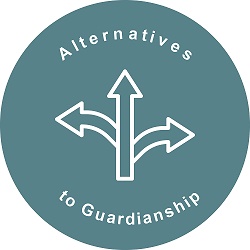
Alternatives to Guardianship Project
What's New
October 10, 2024
Presentation on Medical Rights

Jennifer Hulme (Hulme Resources Inc.) and Thomas F. Coleman (Spectrum Institute) make a presentation today at the annual conference of the Missouri Association of County Developmental Disabilities Services (MACDDS). The presentation is titled "Empowering Transition-Age Youth and Beyond: Navigating Medical Decision-Making." To access the PowerPoint presentation, click here.
September 10, 2024
Workgroup Releases Final Report
 The
Missouri Medical Rights Workgroup released its final report today. (See
announcement) After many months of study and discussions, a set of
proposals were developed to protect and enhance the medical
decision-making rights of adults with developmental disabilities while
at the same time respecting the ethical and legal duties of health care
providers. Improvements in the way that transition planning is
conducted for teenagers with disabilities were also suggested. The
report also directs patients, families, and providers to educational
materials designed to help them understand their role in the medical
decision-making process. For a copy of the report,
click here.
The report was also sent to members of the
Senate Health and Mental Health Policy Committee and to the
House Health and Welfare Committee.
The
Missouri Medical Rights Workgroup released its final report today. (See
announcement) After many months of study and discussions, a set of
proposals were developed to protect and enhance the medical
decision-making rights of adults with developmental disabilities while
at the same time respecting the ethical and legal duties of health care
providers. Improvements in the way that transition planning is
conducted for teenagers with disabilities were also suggested. The
report also directs patients, families, and providers to educational
materials designed to help them understand their role in the medical
decision-making process. For a copy of the report,
click here.
The report was also sent to members of the
Senate Health and Mental Health Policy Committee and to the
House Health and Welfare Committee.June 25, 2024

The Project has released the full set of materials reviewed by the Medical Rights Workgroup over the past several months. The 26 documents comprise 284 pages and include reports, articles, guidance materials, brochures, PowerPoints, and a 54-minute video. Each listing has a link to the relevant document online. The materials will be helpful to patients with developmental disabilities and their families as well as health care providers, educators, advocates, and government officials. To access the document, click here.
June 24, 2024
List of Guardianship Reform Proposals Submitted to DOJ

A collaborative effort known as Advocates for Guardianship Reform is following up on the recently filed report of the U.S. Department of Justice which found the state's guardianship system in violation of the Americans with Disabilities Act. The group, which has formulated specific proposals to the DOJ, is a collaboration of Hulme Resources Inc., Spectrum Institute, and the Center for Estate Administration Reform. The proposals have received positive feedback from colleagues at Missouri Protection and Advocacy and the Missouri Association of Public Administrators.
Some of the proposals are aimed at the judiciary which was barely mentioned in the DOJ report. "Judges conduct guardianship proceedings, appoint attorneys to defend people with disabilities, decide cases, and select guardians to make decisions for vulnerable adults," said Thomas F. Coleman, a legal consultant to the Alternatives to Guardianship Project. "Meaningful reforms to bring Missouri's guardianship system into compliance with the ADA must include judges and court-appointed attorneys." For a copy of the proposals, click here.
June 20, 2024
Presentation about Workgroup Made at National Conference

Thomas F. Coleman made a presentation today about the Missouri Medical Rights Workgroup at the annual conference of the Alliance for Disability in Health Care Education. Coleman is a member of the Alliance as is Spectrum Institute chairperson Tina Baldwin. Coleman and Baldwin hope that the presentation will lead to the formation of similar workgroups in other states. For a copy of the PowerPoint presentation, click here.
June 18, 2024
Workgroup is Briefed on Details of New Federal Regulations

Members of the Missouri Medical Rights Workgroup attended a zoom meeting during which attorney Thomas F. Coleman explained the key elements of new federal rules prohibiting disability discrimination by health care providers redeiving federal funds. Eliminating such discrimination is likely to result in fewer recommendations from providers that patients be placed into a guardianship. Coleman also explained how patients and family supporters can file complaints with providers and with state and federal government agencies if and when they experience such discrimination. To view the video of the presentation, which included a Q/A session, click here.
June 18, 2024
DOJ Releases Findings of Investigation into Missouri's Misuse of Guardianships for Nursing Home Placements
 The
federal Department of Justice has been investigating guardianship and
nursing home practices in Missouri for more than 18 months. (See posting
below for Nov. 18, 2022) Today it released a report finding that
the state is violating Title II of the Americans with Disabilities Act
by overusing guardiansip proceedings to unnecessarily institutionalise
adults with mental health disabilities in nursing homes. For a
link to the full report,
click here. For a video from the Civil Rights Division about
the investigation,
click here.
The
federal Department of Justice has been investigating guardianship and
nursing home practices in Missouri for more than 18 months. (See posting
below for Nov. 18, 2022) Today it released a report finding that
the state is violating Title II of the Americans with Disabilities Act
by overusing guardiansip proceedings to unnecessarily institutionalise
adults with mental health disabilities in nursing homes. For a
link to the full report,
click here. For a video from the Civil Rights Division about
the investigation,
click here. The DOJ is holding a zoom meeting to discuss the matter and announce next steps. To attend the zoom on Tuesday, June 25th at 6:00pmCT/7:00pmET, click here. To attend the meeting on Wednesday, June 26th at 12:00pmCT / 1:00pmET, click here.
The DOJ is soliciting comments on how it can address these violations. To make suggestions, write to: Community.Missouri@usdoj.gov. The Alternatives to Guardianship Project, along with Spectrum Institute and the Center for Estate Administration Reform, are submitting the following recommendations.
The DOJ should focus its remedial efforts on: (1) underfunding of public
administrators; (2) inadequate education of judges on the ADA and less
restrictive alternatives including supported decision-making; (3) lack
of training and performance standards for court appointed counsel in
guardianship cases; (4) annual reports of guardians are not being sent
to the guardianized adult or court-appointed counsel (CAC), and so there
is no opportunity to contest the contents; (5) CAC abandons the client
when the guardianship order is entered and as a result there is no
meaningful access to counsel for guardianized adults after that; (6) the
modification/termination process is not being made accessible to
guardianized adults with mental health disabilities.
May 24, 2024
Report on New Federal Regulations Sent to Medical Rights Workgroup for Review
 The
Missouri Medical Rights Workgroup will be reviewing a report produced by
Spectrum Institute on new federal regulations on disability
discrimination by health care providers receiving federal funds.
The report will be discussed at the workgroup's meeting on June 18.
Once finalized, the report will be distributed to disability rights
organizations, health care providers, and professional associations for
hospitals and medical and mental health professionals. It will
also be sent to the deans of schools of medicine, dentistry, nursing,
social work, and psychology. Later in the year, key elements of
the report will be included in educational materials for patients with
developmental disabilities, family supporters, and health care providers
who serve this patient population. For a copy of the report,
click here.
The
Missouri Medical Rights Workgroup will be reviewing a report produced by
Spectrum Institute on new federal regulations on disability
discrimination by health care providers receiving federal funds.
The report will be discussed at the workgroup's meeting on June 18.
Once finalized, the report will be distributed to disability rights
organizations, health care providers, and professional associations for
hospitals and medical and mental health professionals. It will
also be sent to the deans of schools of medicine, dentistry, nursing,
social work, and psychology. Later in the year, key elements of
the report will be included in educational materials for patients with
developmental disabilities, family supporters, and health care providers
who serve this patient population. For a copy of the report,
click here.March 26, 2024
Outreach Underway to Missouri Hospitals
 Public
and private health care providers that receive federal funding, if they
have 15 or more employees, are required by federal law to designate a
staff person to coordinate compliance with the nondiscrimination
provisions of Section 504 of the Rehabilitation Act of 1973. The
Affordable Care Act has a similar requiremnent for compliance with the
nondiscrimination provisions of Section 1557 of that law.
Public
and private health care providers that receive federal funding, if they
have 15 or more employees, are required by federal law to designate a
staff person to coordinate compliance with the nondiscrimination
provisions of Section 504 of the Rehabilitation Act of 1973. The
Affordable Care Act has a similar requiremnent for compliance with the
nondiscrimination provisions of Section 1557 of that law.There are 168 licensed hospitals in Missouri. The Alternatives to Guardianship Project is contacting the larger hospitals (facilities with 100+ hospital beds) to alert management that the federal Department of Health and Human Services will be issuing a final rule in the coming weeks to update the disability nondiscrimination requirement of Section 504 with respect to the delivery of health care services by providers that receive federal funds. For a copy of the flier we are sending these hospitals, click here.
February 21, 2024
AMA and Others Support HHS Rule Against Disability Discrimination in Health Care Services
 The
American Medical Association submitted a
letter to the Department of Health and Human Services regarding its
proposed rule under Section 504 of the Rehabilitation Act of 1973 to
clarify prohibitions against disability discrimination by health care
providers that receive federal funds. The AMA generally supports
most aspects of the new rule, noting: "The AMA believes firmly that
discrimination has no place in the practice of medicine." Other
organizations expressing support include: National Academy of Elder Law
Attorneys (NAELA);
National Association of State Directors of Developmental Disability
Services (NASDDDS);
Association of American Medical Colleges (AAMC);
National Health Council (NHC);
Missouri Developmental Disabilities Council (MODDC).
We are awaiting word from the White House as to when HHS anticipates it
will finalize the rule. The Alternatives to Guardianship Project
has
analyzed the proposed rule for its impact on the medical
decision-making rights of adults with developmental disabilities.
The
American Medical Association submitted a
letter to the Department of Health and Human Services regarding its
proposed rule under Section 504 of the Rehabilitation Act of 1973 to
clarify prohibitions against disability discrimination by health care
providers that receive federal funds. The AMA generally supports
most aspects of the new rule, noting: "The AMA believes firmly that
discrimination has no place in the practice of medicine." Other
organizations expressing support include: National Academy of Elder Law
Attorneys (NAELA);
National Association of State Directors of Developmental Disability
Services (NASDDDS);
Association of American Medical Colleges (AAMC);
National Health Council (NHC);
Missouri Developmental Disabilities Council (MODDC).
We are awaiting word from the White House as to when HHS anticipates it
will finalize the rule. The Alternatives to Guardianship Project
has
analyzed the proposed rule for its impact on the medical
decision-making rights of adults with developmental disabilities.
February 7, 2024
National Data: Missouri is Overusing Guardianships
 The
National Core Indicators® – Intellectual and Developmental Disabilities
(NCI®-IDD) is a voluntary effort by state developmental disability
agencies to track their performance using a standardized set of consumer
and family surveys with nationally validated measure. An analysis
of NCI data for several recent years reveals that Missouri adults with
developmental disabilities are being placed into guardianships at a much
higher rate than the national average. A majority of families in
Missouri are not being advised on alternatives to guardianship. To
read excerpts from the Missouri surveys with comparisons to national
averages,
click here.
The
National Core Indicators® – Intellectual and Developmental Disabilities
(NCI®-IDD) is a voluntary effort by state developmental disability
agencies to track their performance using a standardized set of consumer
and family surveys with nationally validated measure. An analysis
of NCI data for several recent years reveals that Missouri adults with
developmental disabilities are being placed into guardianships at a much
higher rate than the national average. A majority of families in
Missouri are not being advised on alternatives to guardianship. To
read excerpts from the Missouri surveys with comparisons to national
averages,
click here. February 6, 2024
Federal Grants Support Medical Self-Determination
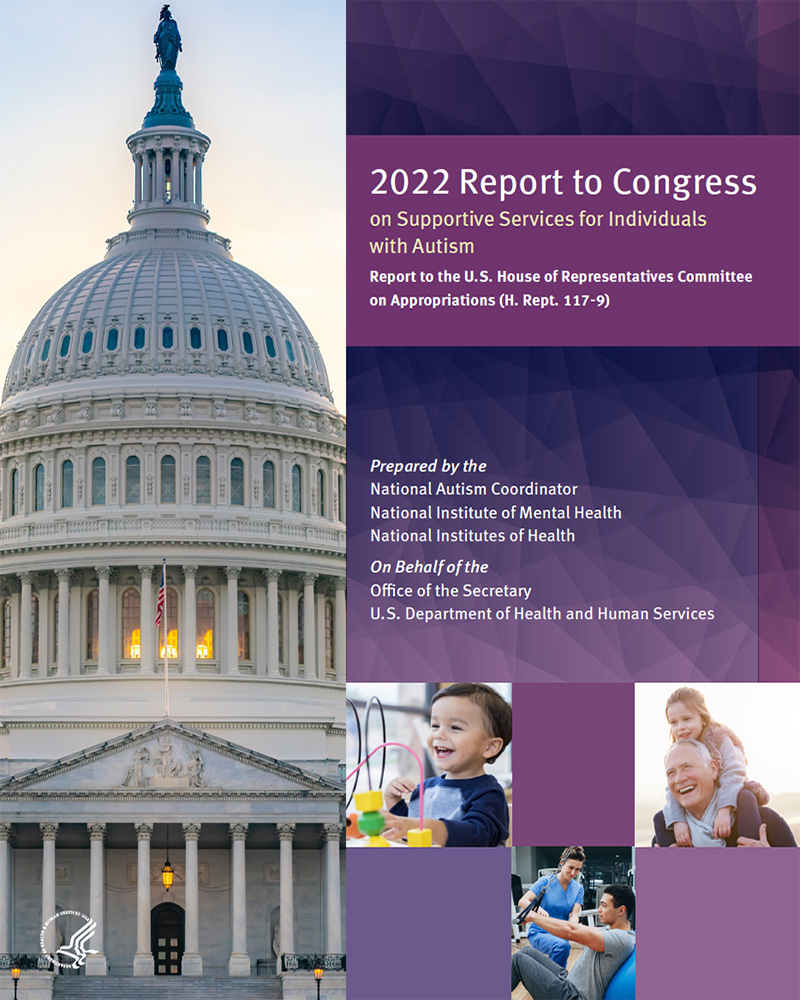 The
U.S. Department of Health and Human Services has submitted a report to
Congress describing a variety of federally-funded projects providing
supoportive services to individuals with autism. This report
describes the supportive services that are beneficial to improved
outcomes for people with autism, some of which are designed to reduce
unnecessary guardianships and promote self-determination. The
grants are administered by the Administration for Community Living
(ACL). ACL was created around the fundamental principle that older
adults and people of all ages with disabilities should be able to live
where they choose, with the people they choose, and with the ability to
participate fully in their communities. For a summary of the
projects that are most related related to medical self-determination,
click here.
The
U.S. Department of Health and Human Services has submitted a report to
Congress describing a variety of federally-funded projects providing
supoportive services to individuals with autism. This report
describes the supportive services that are beneficial to improved
outcomes for people with autism, some of which are designed to reduce
unnecessary guardianships and promote self-determination. The
grants are administered by the Administration for Community Living
(ACL). ACL was created around the fundamental principle that older
adults and people of all ages with disabilities should be able to live
where they choose, with the people they choose, and with the ability to
participate fully in their communities. For a summary of the
projects that are most related related to medical self-determination,
click here. February 6, 2024
Missouri Lagging on Alternatives to Guardianship
 The
National Council on Disability reports that Missouri is among the top
three states with the highest percent of adults with developmental
disabilities who have been ordered into a guardianship.
Missouri guardianizes such adults at a rate 15 times greater than
Delaware, 8 times greater than South Carolina, and nearly 5 times
greater than Georgia.
The
National Council on Disability reports that Missouri is among the top
three states with the highest percent of adults with developmental
disabilities who have been ordered into a guardianship.
Missouri guardianizes such adults at a rate 15 times greater than
Delaware, 8 times greater than South Carolina, and nearly 5 times
greater than Georgia. To read a commentary about how educators, health care professionals, judges, and attorneys are contributing to the overuse of guardianships in Missouri, and how more education is needed to minimize unnecessary guardianships, click here.
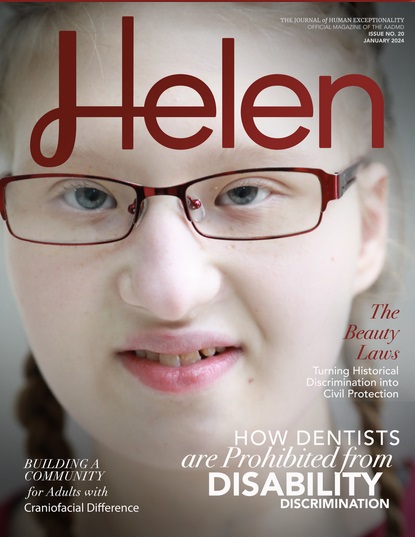 January 20, 2024
January 20, 2024Journal Article Published on Dental Ethics and Disability Discrimination
Helen, the official journal of the American Academy of Developmental Medicine and Dentistry, has published an article in its January 2024 edition titled: "How Dentists are Prohibited from Disability Discrimination." The article cites relevant laws as well as provisions of the code of dental ethics. It also mentions the work being done by the Alternatives to Guardianship Project in Missouri. To read the article, click here.
January 17, 2024
Medical Rights Workgroup Meets Jan 23 and 26
Stakeholders representing a wide range of interests will meet during the week of January 22 to explore ways to better protect the medical rights of patients with developmental disabilities while also respecting the legal and ethical duties of health care providers. Click here for access to a webpage for the workgroup.
Participants include self-advocates, parents, health care practitioners and administrators, disability rights advocates, university professors, and government regulators. The fields of medicine, psychiatry, nursing, dentistry, social work, protective services, disability services, and law are represented.
Some 21 members will meet on Jan 23 while 8 pof them will meet on Jan 26.
To read the orientation letter sent to workgroup members, click here. For a factsheet about the workgroup, click here. For a list of participants, click here.
October 4, 2023
Medical Rights Workgroup Forming in Missouri
 The American Academy of
Developmental Medicine and Dentistry, Spectrum Institute, and the
Alternatives to Guardianship Project are convening a workgroup to
explore medical decision-making options available to adults with
developmental disabilities.
The American Academy of
Developmental Medicine and Dentistry, Spectrum Institute, and the
Alternatives to Guardianship Project are convening a workgroup to
explore medical decision-making options available to adults with
developmental disabilities. Workgroup participants will include a wide range of stakeholders in Missouri, including self advocates and parent advocates, as well as representatives from disability rights advocacy groups, disability services organizations, state and local government agencies, and professional and trade associations representing the interests of a variety of health care providers.
The workgroup will identify ways in which patients, families, and providers can work together to protect the medical rights of this patient population while also respecting the ethical and legal duties of health care professionals. For more information, click here.
September 26, 2023
AADMD's Magazine Features an Article on Medical Rights of Patients with Developmental Disabilities
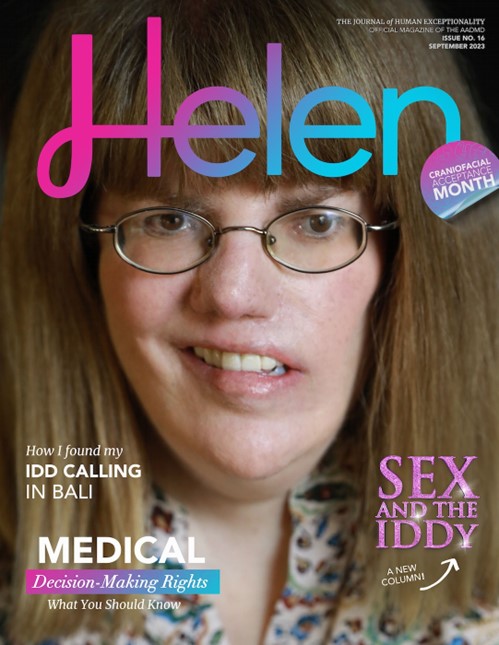 Helen
is the official magazine of the American Academy of Developmental
Medicine and Dentistry (AADMD). The September issue of Helen
included an article on medical decision-making rights written by Thomas
F. Coleman, legal consultant to the Alternatives to Marriage Project.
Helen is proud to "feature evidence-based best practices,
advice to navigate the ability lifestyle, tools for advocacy & more."
The journal "represents the cross-specialties composed of healthcare,
education and policy makers along with the disability community
(families, self-advocates and caregivers)." To read or download
the article,
click
here. For a free subscription to Helen,
click here. To
read past issues, click
here.
Helen
is the official magazine of the American Academy of Developmental
Medicine and Dentistry (AADMD). The September issue of Helen
included an article on medical decision-making rights written by Thomas
F. Coleman, legal consultant to the Alternatives to Marriage Project.
Helen is proud to "feature evidence-based best practices,
advice to navigate the ability lifestyle, tools for advocacy & more."
The journal "represents the cross-specialties composed of healthcare,
education and policy makers along with the disability community
(families, self-advocates and caregivers)." To read or download
the article,
click
here. For a free subscription to Helen,
click here. To
read past issues, click
here.September 12, 2023
Report: HHS Publishes Proposed Federal Rule on Disability Discrimination by Federally Funded Health Care Providers
 Spectrum Institute has
produced a new report for the Alternatives to Guardianship Project.
The report comments on a proposed rule by the federal Health and Human
Services Department clarifying prohibitions on disability discrimination
by hospitals, doctors, dentists, and other health care providers who
receive federal funds. The rule affirms the rights of adult
patients with mental or developmental disabilities and specifies the
duties of providers with respect to this patient population. The report
will help providers to comply with federal law. It also provides
guidance to patients and their families or other supporters who may want
to file complaints with HHS for any nonpompliance. For a copy of
the report,
click here.
Spectrum Institute has
produced a new report for the Alternatives to Guardianship Project.
The report comments on a proposed rule by the federal Health and Human
Services Department clarifying prohibitions on disability discrimination
by hospitals, doctors, dentists, and other health care providers who
receive federal funds. The rule affirms the rights of adult
patients with mental or developmental disabilities and specifies the
duties of providers with respect to this patient population. The report
will help providers to comply with federal law. It also provides
guidance to patients and their families or other supporters who may want
to file complaints with HHS for any nonpompliance. For a copy of
the report,
click here. The report was sent to: Missouri Hospital Association, Missouri State Medical Association, Missouri Psychiatric Physicians Association, Missouri Association of Osteopathic Physicians and Surgeons, Missouri Nurses Association, Missouri Dental Association, Missouri Pharmacy Association, Missouri Psychological Association, Missouri Chapter of the National Association of Social Workers, Missouri Health Care Association, Missouri Primary Care Association, Missouri Health Information Management Association, Missouri Association of Local Public Health Agencies, Missouri Society of Health Care Attorneys, Community Health Workers Association,
Missouri Rural Health Association, and the Missouri Behavioral Health Council.
September 8, 2023
Appeals Court Accepts Legal Brief from Alternatives to Guardianship Project and Others

The Appellate Division of the New Jersey Superior Court entered an order today accepting a friend-of-the-court brief filed by the Alternatives to Guardianship Project and nine other organizations. The brief urges the court to issue an opinion that not only protects the medical rights of Peter Brumlik, a young college student on the autism spectrum, but gives guidance to judges and attorneys in other cases involving adults with developmental disabilities who become entangled in guardianship proceedings. For information about the participating organizations, click here. To read or download the brief, click here. (Photos: (from left to right) Peter with his father; Peter; Peter and his friend Eric on a hiking trail in New Jersey)
July 6, 2023
Guidance for Patients, Families, and Providers
on Medical Decision-Making

A comprehensive guidebook on the medical decision-making rights of adult patients with developmental disabilities is now available. It has information for patients, families, health care providers, state agencies, and professional associations. The book includes an annotated bibliography of relevant state and federal statutes, regulations and court cases. To access the guidebook, click here.
June 21, 2023
New Resource: Rainbow Support Group Guidebook
 "Our
Lives, Our Choices, Our Rights" is a guidebook about people with
developmental disabilities who identify as LGBTQ+. It is written
by people with developmental disabilities primarily for supporters,
families, and service providers. Information in the guidebook is based
on
the personal and professional experiences of the authors, as well as
interviews with 23 other LGBTQ+ adults with intellectual and
developmental disabilities. The guidebook has 12 chapters,
including those on gender and sexuality, human rights, and sex
education. A list of valuable and informative resources is also
provided. To access the guidebook or to watch a short (4 min.)
video about it,
click here.
"Our
Lives, Our Choices, Our Rights" is a guidebook about people with
developmental disabilities who identify as LGBTQ+. It is written
by people with developmental disabilities primarily for supporters,
families, and service providers. Information in the guidebook is based
on
the personal and professional experiences of the authors, as well as
interviews with 23 other LGBTQ+ adults with intellectual and
developmental disabilities. The guidebook has 12 chapters,
including those on gender and sexuality, human rights, and sex
education. A list of valuable and informative resources is also
provided. To access the guidebook or to watch a short (4 min.)
video about it,
click here.
June 13, 2023
Transitioning to Adulthood: Resources for Patients, Parents and Medical Providers

This annotated bibliography directs readers to a variety to resources to help patients with developmental disabilities have an effective and meaningful relationship with doctors, clinics, and hospitals. While some materials are helpful to patients of any adult age, most of them are geared for teens who are preparing to assume primary responsibility for their medical care once they become adults. The bibliography has four sections: For Patients, For Parents, For Providers, and Research. To access this document, click here.
May 1, 2023
Medical Associations Receive Report on Patient Decision Making Options
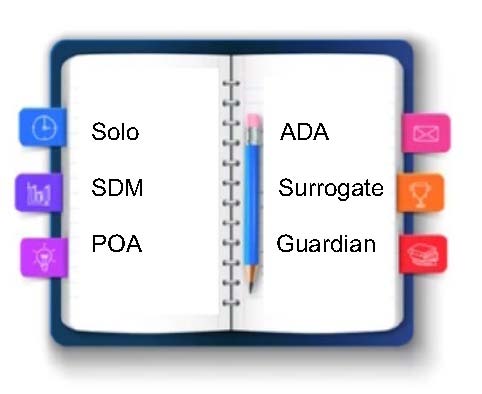 The
Alternatives to Guardianship Project has sent a report on
decision-making options for patients with developmental disabilities to
medical associations and disability rights stakeholders in Missouri.
The report explains that such decision making should not be an all
(independent) or nothing (guardianship) proposition. Other options
exist for medical professionals to receive informed consent for medical
services and medications. Medical and disability stakeholders were
invited to work with us in identifying ways to improve the medical
decision-making evaluation process and to better protect the rights of
this patient population. For a copy of the report,
click here.
The
Alternatives to Guardianship Project has sent a report on
decision-making options for patients with developmental disabilities to
medical associations and disability rights stakeholders in Missouri.
The report explains that such decision making should not be an all
(independent) or nothing (guardianship) proposition. Other options
exist for medical professionals to receive informed consent for medical
services and medications. Medical and disability stakeholders were
invited to work with us in identifying ways to improve the medical
decision-making evaluation process and to better protect the rights of
this patient population. For a copy of the report,
click here.April 13, 2023
Exploring the Role of Psychologists and Social Workers in Guardianship Evaluations
 Legislation
passed in 2018 requires Missouri courts to thoroughly examine whether
guardianship respondents are partially or fully incapacitated and, if
so, to evaluate whether less restrictive alternatives to guardianship
would ensure their safety. The court may appoint a licensed
psychologist or other professional to conduct these assessments.
Psychologists are appropriate to evaluate mental capacity. Social
workers are appropriate to determine whether supports and services are
available in the community to assist an adult with decision-making and
therefore avoid the necessity of a guardianship. The Alternatives
to Guardianship Project has invited officials at the
Missouri Psychological Association to communicate with us about the
role of psychologists in the capacity assessment process. We have
reached out to the
Missouri Chapter of the National Association of Social Workers to
discuss the role of social workers in guardianship proceedings.
Legislation
passed in 2018 requires Missouri courts to thoroughly examine whether
guardianship respondents are partially or fully incapacitated and, if
so, to evaluate whether less restrictive alternatives to guardianship
would ensure their safety. The court may appoint a licensed
psychologist or other professional to conduct these assessments.
Psychologists are appropriate to evaluate mental capacity. Social
workers are appropriate to determine whether supports and services are
available in the community to assist an adult with decision-making and
therefore avoid the necessity of a guardianship. The Alternatives
to Guardianship Project has invited officials at the
Missouri Psychological Association to communicate with us about the
role of psychologists in the capacity assessment process. We have
reached out to the
Missouri Chapter of the National Association of Social Workers to
discuss the role of social workers in guardianship proceedings. April 12, 2023
Reaching Out to Nursing, Medical and Hospital Associations
 The
Alternatives to Guardianship Project has invited associations
representing physicians, nurses, and hospitals in Missouri to explore
medical decision-making options for adults with developmental
disabilities. More than 73,000 adult patients in Missouri have such
disabilities. Most of them are not living under an order of guardianship.
Options for those not in a guardianship include a power of attorney for
health care, a health care proxy, and a medical supported
decision-making agreement. We eagerly await a response from the
Missouri State Medical Association, the
Missouri Nurses Association, and the
Missouri Hospital Association.
Update (4-20-23) The medical association has
accepted our invitation to discuss this important issue.
The
Alternatives to Guardianship Project has invited associations
representing physicians, nurses, and hospitals in Missouri to explore
medical decision-making options for adults with developmental
disabilities. More than 73,000 adult patients in Missouri have such
disabilities. Most of them are not living under an order of guardianship.
Options for those not in a guardianship include a power of attorney for
health care, a health care proxy, and a medical supported
decision-making agreement. We eagerly await a response from the
Missouri State Medical Association, the
Missouri Nurses Association, and the
Missouri Hospital Association.
Update (4-20-23) The medical association has
accepted our invitation to discuss this important issue. April 10, 2023
Adding Health Care Proxies to Medical Toolkit
 When
it comes to medical decision-making, it is not one-size-fits-all for
adults with developmental disabilities. Some can make their own
medical decisions without help. Others need supported
decision-making. Some have the capacity to delegate
decision-making authority to others through a standard medical power of
attorney. But these tools are not practical for some adults with
developmental disabilities who have limited capacity to give informed
consent for medical procedures. And yet, despite having diminished
mental abilities, such adults may have capacity to designate a
trusted person to act as a surrogate for medical decision-making.
We suggest that new legislation be developed in Missouri authorizing
health care proxies for adults with developmental disabilities, such as
has been done in Utah and Vermont. To read or download our
proposal,
click here.
When
it comes to medical decision-making, it is not one-size-fits-all for
adults with developmental disabilities. Some can make their own
medical decisions without help. Others need supported
decision-making. Some have the capacity to delegate
decision-making authority to others through a standard medical power of
attorney. But these tools are not practical for some adults with
developmental disabilities who have limited capacity to give informed
consent for medical procedures. And yet, despite having diminished
mental abilities, such adults may have capacity to designate a
trusted person to act as a surrogate for medical decision-making.
We suggest that new legislation be developed in Missouri authorizing
health care proxies for adults with developmental disabilities, such as
has been done in Utah and Vermont. To read or download our
proposal,
click here. April 8, 2023
Outreach to Missouri Law Schools
 Spectrum
Institute has written to the deans of four law schools in Missouri --
Washington University, St. Louis University, University of Missouri, and
University of Missouri at Kansas City -- to open a conversation
regarding internship opportunities for law students with nonprofit
organizations promoting reforms to the adult guardianship system in that
state. Students would conduct research into the processing of such
cases to identify systematic violations of state and federal laws that
harm the rights of adults with mental and developmental disabilities.
Results of the research would be used to file administrative complaints
with state and federal agencies, to educate the Missouri Supreme Court,
and to inform the development of new legislation to provide additional
safeguards for this vulnerable population. For a copy of the
communication to the law school dean at Washington University,
click here. Similar letters were sent to the other three
deans.
Spectrum
Institute has written to the deans of four law schools in Missouri --
Washington University, St. Louis University, University of Missouri, and
University of Missouri at Kansas City -- to open a conversation
regarding internship opportunities for law students with nonprofit
organizations promoting reforms to the adult guardianship system in that
state. Students would conduct research into the processing of such
cases to identify systematic violations of state and federal laws that
harm the rights of adults with mental and developmental disabilities.
Results of the research would be used to file administrative complaints
with state and federal agencies, to educate the Missouri Supreme Court,
and to inform the development of new legislation to provide additional
safeguards for this vulnerable population. For a copy of the
communication to the law school dean at Washington University,
click here. Similar letters were sent to the other three
deans.April 6, 2023
Missouri Supreme Court Urged to Seek Federal Grant
 The
Alternatives to Guardianship Project sent a letter to Missouri Chief
Justice Paul Wilson today. It urged the Supreme Court to apply for
a guardianship improvement grant from a federal agency known as the
Administration for Community Living. The letter explained that
supreme courts in several other states have received substantial funding
to review and improve their adult guardianship systems. The letter
also informed the court that funds may be approved by Congress under a
pending bill to recruit and train law students to assist with legal
advocacy for adults who are respondents in guardianship proceedings.
Law students could help court-appointed lawyers explore and develop
alternatives to guardianship such as supported decision-making.
Copies of the letter are being sent to deans of the four law schools
located in Missouri. To read the letter,
click here. (Photo: Chief Justice Wilson)
The
Alternatives to Guardianship Project sent a letter to Missouri Chief
Justice Paul Wilson today. It urged the Supreme Court to apply for
a guardianship improvement grant from a federal agency known as the
Administration for Community Living. The letter explained that
supreme courts in several other states have received substantial funding
to review and improve their adult guardianship systems. The letter
also informed the court that funds may be approved by Congress under a
pending bill to recruit and train law students to assist with legal
advocacy for adults who are respondents in guardianship proceedings.
Law students could help court-appointed lawyers explore and develop
alternatives to guardianship such as supported decision-making.
Copies of the letter are being sent to deans of the four law schools
located in Missouri. To read the letter,
click here. (Photo: Chief Justice Wilson)March 30, 2023
U.S. Senate Committee Holds Hearing on Guardianship Alternatives
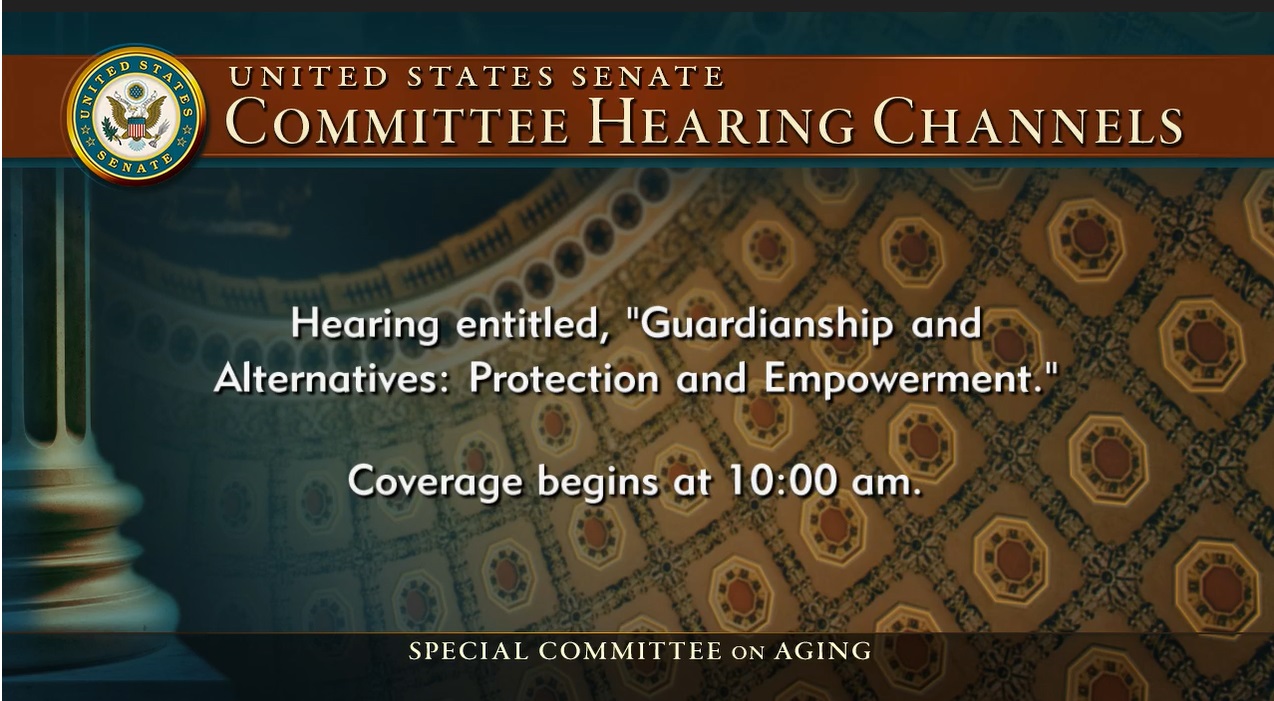
The Select Committee on Aging of the United States Senate held a hearing today, taking testimony from experts and victims of guardianship abuse on how the federal government can prod the states to use les restrictive alternatives to guardianship, such as supported decision-making. Witnesses stressed that guardianship should be a last resort, not a first choice or default position for adults with mental or developmental disabilities. Spectrum Institute submitted recommendations to the committee in advance of the hearing. To view a video of the proceedings, click here. Those who would like to share stories about guardianships or offer recommendations for reform may have their remarks placed in the record of the hearing if the committee receives them by April 7. Send comments to: guardianships@aging.senate.gov
As a follow up to the hearing, Sen. Casey introduced a bill to create a national advisory council to promote alternatives to guardianship and to collect data from the states on existing guardianships. In addition, it would provide funding for state to have a protection and advocacy agency focused on the rights of people being considered for and living under a guardianship. This network of state agencies would be built upon the existing network of protection and advocacy agencies authorized by the Developmental Disabilities Act of 2000. For more information on S1148, click here.
March 4, 2023
Marriage Rights: Legal Authorities and Current Practices
 The
freedom to marry has long been recognized as one of the vital personal
rights essential to the orderly pursuit of happiness. That is why
the freedom to marry is constitutionally protected. But for adults
with developmental disabilities, a variety of barriers often block their
access to marriage. Obstacles to marriage include overly
restrictive definitions of "capacity to marry," the failure of schools
and service providers to educate teens and young adults about the
benefits and obligations of marriage, and economic penalties that may be
imposed by federal and state benefits programs on those who choose to
marry.
The
freedom to marry has long been recognized as one of the vital personal
rights essential to the orderly pursuit of happiness. That is why
the freedom to marry is constitutionally protected. But for adults
with developmental disabilities, a variety of barriers often block their
access to marriage. Obstacles to marriage include overly
restrictive definitions of "capacity to marry," the failure of schools
and service providers to educate teens and young adults about the
benefits and obligations of marriage, and economic penalties that may be
imposed by federal and state benefits programs on those who choose to
marry.This report explains the legal basis for the freedom to marry for adults with developmental disabilities. It also makes recommendations on how the State of Missouri can assist such adults in making that right become a reality. Although this report focuses primarily on Missouri, it contains information that would be relevant to any state. To read or download the report, click here.
February 27, 2023
Sexual Rights: Legal Authorities
 As
a companion document to the bibliography on sexual rights, a memo is now
available explaining the legal authorities supporting the freedom of
intimate association guaranteed by the constitution to consenting
adults, including those who have developmental disabilities. The
abstract to the memo explains: "Adults with developmental disabilities –
regardless of gender, marital status, or sexual orientation – deserve
the same opportunity to experience sexual relationships as adults
without disabilities. This legal report on the parameters of the freedom
of intimate association, along with the related bibliography of academic
and professional literature, are intended to provide a better
understanding of the sexual rights of adults with developmental
disabilities. Such an understanding should lead to an informed and
balanced approach to a sensitive topic." To access the legal memo,
click here.
As
a companion document to the bibliography on sexual rights, a memo is now
available explaining the legal authorities supporting the freedom of
intimate association guaranteed by the constitution to consenting
adults, including those who have developmental disabilities. The
abstract to the memo explains: "Adults with developmental disabilities –
regardless of gender, marital status, or sexual orientation – deserve
the same opportunity to experience sexual relationships as adults
without disabilities. This legal report on the parameters of the freedom
of intimate association, along with the related bibliography of academic
and professional literature, are intended to provide a better
understanding of the sexual rights of adults with developmental
disabilities. Such an understanding should lead to an informed and
balanced approach to a sensitive topic." To access the legal memo,
click here.February 20, 2023
Sexual Rights: Annotated Bibliography
 A
47-page bibliography of academic and professional literature is now
available containing policy statements, reports, and articles on the
sexual rights of adults with developmental disabilities. The
bibliography offers those with a sincere interest in this topic access
to a wide range of literature on which to build a new set of policies
and protocols that will respect and protect the sexual rights of adults
with developmental disabilities in Missouri or elsewhere. To
access the bibliography,
click
here.
A
47-page bibliography of academic and professional literature is now
available containing policy statements, reports, and articles on the
sexual rights of adults with developmental disabilities. The
bibliography offers those with a sincere interest in this topic access
to a wide range of literature on which to build a new set of policies
and protocols that will respect and protect the sexual rights of adults
with developmental disabilities in Missouri or elsewhere. To
access the bibliography,
click
here.February 14, 2023
Social Rights: First of Three Reports
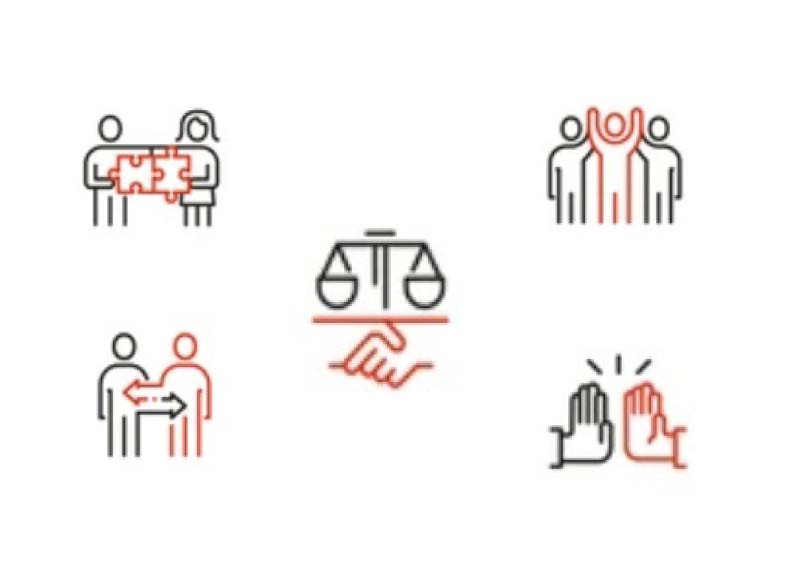 Social
Rights of Adults with Developmental Disabilities explains the legal
basis for the rights that such adults have in connection with their
social decisions, activities, and relationships. It focuses on
provisions in the constitutions of the United
States and the State of Missouri, as well as various federal and state
statutes. The report is written for the benefit of self-advocates,
parents, service providers, and state agencies charged with protecting
the rights of people with developmental disabilities. It is also
intended to educate judges, court-appointed attorneys, and guardians
involved in adult guardianship proceedings. To access the report,
click here. A more user-friendly booklet will be produced in
the near future for self-advocates.
Social
Rights of Adults with Developmental Disabilities explains the legal
basis for the rights that such adults have in connection with their
social decisions, activities, and relationships. It focuses on
provisions in the constitutions of the United
States and the State of Missouri, as well as various federal and state
statutes. The report is written for the benefit of self-advocates,
parents, service providers, and state agencies charged with protecting
the rights of people with developmental disabilities. It is also
intended to educate judges, court-appointed attorneys, and guardians
involved in adult guardianship proceedings. To access the report,
click here. A more user-friendly booklet will be produced in
the near future for self-advocates.A second report will focus on the sexual rights and responsibilities of adults with developmental disabilities. A third will concentrate on the right to marry.
Once these legal reports are published, the Capacity to Love Project will survey and analyze how school districts are educating teenagers and young adults on these issues, what the Division on Developmental Disabilities has to say about them, and the extent to which participants in guardianship proceedings are being educated on these topics. The project will also survey what actions have been taken by developmental service agencies in other states, such as Massachusetts, to produce resource materials on topics related to disability and sexuality.
February 9, 2023
Capacity to Love Project is Launched
 Capacity
to Love is a project focusing on the social and sexual rights and
responsibilities of adults with developmental disabilities, regardless
of sexual orientation or gender identity. Capacity to Love
promotes the education and counseling of adults with developmental
disabilities about their social and sexual rights and responsibilities.
It also promotes the education of guardians, court-appointed lawyers,
care providers, and adult protective service workers of their duty to
respect these rights – appropriately considering the interests of such
adults in both freedom of choice and freedom from abuse. For more
information,
click here. Capacity to Love is a function of the
Alternatives to Guardianship Project in collaboration with Spectrum
Institute. It is endorsed by the Missouri Developmental
Disabilities Council.
Capacity
to Love is a project focusing on the social and sexual rights and
responsibilities of adults with developmental disabilities, regardless
of sexual orientation or gender identity. Capacity to Love
promotes the education and counseling of adults with developmental
disabilities about their social and sexual rights and responsibilities.
It also promotes the education of guardians, court-appointed lawyers,
care providers, and adult protective service workers of their duty to
respect these rights – appropriately considering the interests of such
adults in both freedom of choice and freedom from abuse. For more
information,
click here. Capacity to Love is a function of the
Alternatives to Guardianship Project in collaboration with Spectrum
Institute. It is endorsed by the Missouri Developmental
Disabilities Council.January 25, 2023
Supported Decision-Making: Options for Missouri

With assistance from Spectrum Institute and funding from the Missouri Developmental Disabilities Council, the Alternatives to Guardianship Project has released a new report promoting the use of supported decision-making (SDM) as an alternative to adult guardianships in Missouri. The report provides a framework to stimulate conversations among stakeholders and strategic planning by advocates for new legislation in Missouri to make SDM and other less restrictive alternatives to guardianship for people with mental and developmental disabilities a viable and practical reality rather than a theoretical possibility. The report is being widely distributed throughout the state. The options it presents will become the basis for a series of zoom forums later this year to encourage feedback and suggestions. The report and the community evaluation process should be valuable to legislators as they consider introducing or supporting SDM legislation. For a copy of the report, click here.
December 31, 2022
Year-End Update on Project Activities
 In
addition to the research and educational activities found on the "what's
new" page regarding policies and practices on guardianship and
alternatives, the project has also been engaged in consultation and
training activities with individuals who have developmental disabilities
and their families. For a summary of those activities
click here.
In
addition to the research and educational activities found on the "what's
new" page regarding policies and practices on guardianship and
alternatives, the project has also been engaged in consultation and
training activities with individuals who have developmental disabilities
and their families. For a summary of those activities
click here.December 1, 2022
ADA Educational Materials Sent to Missouri Courts
 An
annotated bibliography prepared by Spectrum Institute for the
Alternatives to Guardianship Project was sent today to ADA Coordinators
at the Supreme Court, State Courts Administrator, and circuit courts
throughout the State of Missouri. A copy was also sent to The
Missouri Bar. The document is titled "How the ADA Applies to
Guardianship Proceedings: A Primer for Missouri's Judges, Attorneys, and
Guardians." The
letter transmitting the document invites bench officers,
administrators, and court staff to review current policies and practices
in adult guardianship proceedings through the lens of what the Americans
with Disabilities Act actually requires. Another document
containing findings of ADA noncompliance by the guardianship system and
recommendations to bring it into conformity with federal law will be
released and sent to Missouri officials in all three branches of
government next year. UPDATE: Jan. 3, 2023.
An
email was sent today to the ADA coordinators of courts throughout
Missouri with a request that they forward an attached report to the
justices, judges, and court administrators. The
report
contains recommendations on how the judicial branch can improve access
to justice for litigants with mental and developmental disabilities in
legal proceedings, especially adult guardianship proceedings.
An
annotated bibliography prepared by Spectrum Institute for the
Alternatives to Guardianship Project was sent today to ADA Coordinators
at the Supreme Court, State Courts Administrator, and circuit courts
throughout the State of Missouri. A copy was also sent to The
Missouri Bar. The document is titled "How the ADA Applies to
Guardianship Proceedings: A Primer for Missouri's Judges, Attorneys, and
Guardians." The
letter transmitting the document invites bench officers,
administrators, and court staff to review current policies and practices
in adult guardianship proceedings through the lens of what the Americans
with Disabilities Act actually requires. Another document
containing findings of ADA noncompliance by the guardianship system and
recommendations to bring it into conformity with federal law will be
released and sent to Missouri officials in all three branches of
government next year. UPDATE: Jan. 3, 2023.
An
email was sent today to the ADA coordinators of courts throughout
Missouri with a request that they forward an attached report to the
justices, judges, and court administrators. The
report
contains recommendations on how the judicial branch can improve access
to justice for litigants with mental and developmental disabilities in
legal proceedings, especially adult guardianship proceedings.November 18, 2022
DOJ Starts Investigation of Missouri's Guardianship System
 The
United States Department of Justice issued a
press release on November 16, 2022 announcing that it has opened an
investigation under the Americans with Disabilities Act to determine
whether Missouri's use of guardianships for people with serious mental
illness contributes to unnecessarily restrictive placements in skilled
nursing facilities. The press release encouraged anyone with
relevant information to contact the DOJ.
The
United States Department of Justice issued a
press release on November 16, 2022 announcing that it has opened an
investigation under the Americans with Disabilities Act to determine
whether Missouri's use of guardianships for people with serious mental
illness contributes to unnecessarily restrictive placements in skilled
nursing facilities. The press release encouraged anyone with
relevant information to contact the DOJ.In response to the request for information, Spectrum Institute sent a written communication to the Civil Rights Division offering to share the results of its own multi-year investigation showing a pattern and practice of ADA violations in Missouri's guardianship proceedings. Thomas F Coleman is the legal director of Spectrum Institute and has been acting as a consultant to the Alternatives to Guardianship Project. He has been working on a major report for the project titled "How the ADA Applies to Guardianship Proceedings: A Primer for Missouri’s Judges, Attorneys, and Guardians." The report and an annotated bibliography on the subject will be sent to the Supreme Court and circuit courts throughout Missouri in January 2023.
Update: (1-29-23) Spectrum Institute filed an ADA complaint with the DOJ on January 12, 2023 alleging that the adult guardianship system is operating in violation of federal law on a wide range of issues. The DOJ acknowledged receiving the complaint. On January 26, Viviana Bonilla-Lopez, a trial attorney with the Special Litigation Section of the DOJ, interviewed Thomas F. Coleman, legal director of Spectrum Institute, to learn additional details about the ADA complaint. Prior to her employment with the DOJ, Ms. Bonilla-Lopez (photo) acquired experience in promoting alternatives to guardianship, including supported decision-making, as a disability rights fellow with Equal Justice Works in Florida. She is heading up the investigation in Missouri described in the press release referenced above.
November 13, 2022
Networking at The Arc National Conference
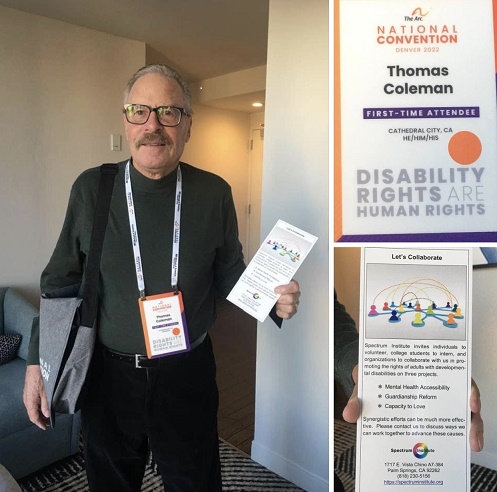 Thomas
F. Coleman attended the national conference of The Arc of the United
States in Denver from November 10 - 12. Tom distributed a
handout about issues being addressed by the Alternatives to
Guardianship Project. He attended a presentation on sexual self
advocacy by Elevatus
Training which shared resources that will be helpful to the
Capacity to Love project that will be launched in Missouri next
year. He also attended a breakout session on supported
decision-making sponsored by The
Tennessee Center for
Decision-Making Support which is a well-developed program that could
be adapted for use in Missouri. Tom spent time exchanging
information with attendees such as Michael Cormier, founder of
3rd Circle Inc. -- a
nonprofit in Michigan providing a wide range of supports for people with
disabilities in residential settings. He also enjoyed meeting and
exchanging views with Shawn Kennemer, President of the
Bakersfield Arc and newly
appointed member of the National Council
on Disability. Tom's husband, Michael Vasquez, accompanied him
to the conference, providing logistical and other support throughout.
The trip was made possible by a generous donation from Richard W. Smith,
Ph.D.
Thomas
F. Coleman attended the national conference of The Arc of the United
States in Denver from November 10 - 12. Tom distributed a
handout about issues being addressed by the Alternatives to
Guardianship Project. He attended a presentation on sexual self
advocacy by Elevatus
Training which shared resources that will be helpful to the
Capacity to Love project that will be launched in Missouri next
year. He also attended a breakout session on supported
decision-making sponsored by The
Tennessee Center for
Decision-Making Support which is a well-developed program that could
be adapted for use in Missouri. Tom spent time exchanging
information with attendees such as Michael Cormier, founder of
3rd Circle Inc. -- a
nonprofit in Michigan providing a wide range of supports for people with
disabilities in residential settings. He also enjoyed meeting and
exchanging views with Shawn Kennemer, President of the
Bakersfield Arc and newly
appointed member of the National Council
on Disability. Tom's husband, Michael Vasquez, accompanied him
to the conference, providing logistical and other support throughout.
The trip was made possible by a generous donation from Richard W. Smith,
Ph.D.November 3, 2022
Public Guardians Lack Adequate Funding and Staff
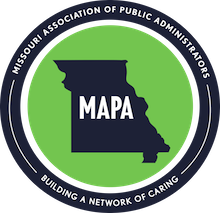 We
recently reached out to the Missouri Association of Public
Administrators (MAPA) for information about their role as guardians for
adults with mental or developmental disabilities. Danielle Boggs,
president of the association, sent us a
report with information relevant to our study. The report
contains findings and recommendations which will help us identify ways
to improve the guardianship system in Missouri.
We
recently reached out to the Missouri Association of Public
Administrators (MAPA) for information about their role as guardians for
adults with mental or developmental disabilities. Danielle Boggs,
president of the association, sent us a
report with information relevant to our study. The report
contains findings and recommendations which will help us identify ways
to improve the guardianship system in Missouri. Public administrators (PAs) throughout the state serve as guardians for 11,000 of the 30,500 adults in Missouri who are living under an order of guardianship. (p.2) One-third of their caseload consists of adults with intellectual or developmental disabilities. (p. 19) While national professional standards call for a ratio of one guardian per 20 protected adults, public administrators in Missouri, on average, have a ratio of one guardian to 90 adults.
In terms of less restrictive alternatives, the report stated: "PAs often do not have the bandwidth for limited guardianship or supported decision-making, even when it is preferable. Guardianship is perceived by some system stakeholders as a loss or reduction of the ward’s independence and rights. However, without appropriate resources to spend additional time in decision-making with wards, PAs cannot easily afford partial rights to wards." (p. 15)
We will be studying this report further, including the findings regarding inadequate funding, as we develop a comprehensive report focusing on all parts of the system and all participants, including the public administrators who are doing the best they can with limited resources to protect and assist vulnerable adults.
November 2, 2022
The Perils of Judicial Control of Guardianship Legal Services: Time for a New Model in Missouri
 The
Alternatives to Guardianship Project recently reviewed the dockets in
hundreds of guardianship cases in 10 circuit courts throughout Missouri.
Our findings are as concerning as they are enlightening. What we
discovered is explained in a commentary we are sending to the Supreme
Court, State Courts Administrator, Circuit Courts, and the State Bar.
We are also sending it to other agencies and organizations with an
interest in improving the administration of justice in adult
guardianship proceedings: Missouri Developmental Disabilities
Council, MO-WINGS, Department of Mental Health, Missouri Association of
Public Administrators, Missouri Protection and Advocacy; and the
Missouri Association of Probate and Associate Circuit Judges.
The
Alternatives to Guardianship Project recently reviewed the dockets in
hundreds of guardianship cases in 10 circuit courts throughout Missouri.
Our findings are as concerning as they are enlightening. What we
discovered is explained in a commentary we are sending to the Supreme
Court, State Courts Administrator, Circuit Courts, and the State Bar.
We are also sending it to other agencies and organizations with an
interest in improving the administration of justice in adult
guardianship proceedings: Missouri Developmental Disabilities
Council, MO-WINGS, Department of Mental Health, Missouri Association of
Public Administrators, Missouri Protection and Advocacy; and the
Missouri Association of Probate and Associate Circuit Judges. We hope the commentary will stimulate a conversation resulting in action to bring about the reforms necessary to ensure access to justice in guardianship proceedings for adults with mental and developmental disabilities. Legislative reforms adopted in 2018 were a good start, but only a start. Much more needs to be done to ensure that alternatives to guardianship are thoroughly explored by court-appointed attorneys and probate judges. And major changes need to be adopted and implemented to ensure that adults are not abandoned, for all practical purposes, by the courts and court-appointed attorneys the moment an order of guardianship is granted. The 30,000 adults living under an order of guardianship are not being given meaningful participation in these ongoing cases as required by the American with Disabilities Act.
Court-appointed attorneys in Missouri are left to their own devices in terms of the scope and methods they use in representing clients in adult guardianship proceedings. In addition to the lack of specialized training (see posting for October 31, 2022), these attorneys are not given performance standards to guide them in zealously advocating for their clients and defending their rights. In sharp contrast to the improvisation that seems to be occurring in Missouri's guardianship courts, Massachusetts gives guardianship attorneys in that state specific performance standards to follow, with a checklist of minimum activities that should be performed in each case.
The commentary calls attention to a model legal advocacy program that has been operating in Nevada for several years -- a program that should be considered for Missouri. To read the commentary, click here.
November 1, 2022
Retention of Voting Rights Varies Widely by County
 After
reviewing months of court records in guardianship proceedings in three
counties in Missouri in 2021, we discovered a major discrepancy in the
percentage of adults who retain the right to vote when they are ordered
into a guardianship. In Platte County, 100% of guardianship orders
in 2021 stripped such adults of the right to vote. In Jackson
County, examining a two-month sample in 2021 showed that some 84% had
their voting rights removed. In contrast, in Jasper County, over a
six-month period in 2021 only 46% had their voting rights taken away.
After
reviewing months of court records in guardianship proceedings in three
counties in Missouri in 2021, we discovered a major discrepancy in the
percentage of adults who retain the right to vote when they are ordered
into a guardianship. In Platte County, 100% of guardianship orders
in 2021 stripped such adults of the right to vote. In Jackson
County, examining a two-month sample in 2021 showed that some 84% had
their voting rights removed. In contrast, in Jasper County, over a
six-month period in 2021 only 46% had their voting rights taken away.State and federal laws come into play in these cases. The federal voting rights act prohibits states from depriving adults of the right to vote because they cannot read, write, or understand the nuances of voting. The federal Americans with Disabilities Act requires states to modify state laws and provide reasonable accommodations to assist disabled adults to vote. The ADA applies to adults with mental and developmental disabilities. We plan to expand our research into local practices to verify the practices of courts in other counties. It appears there is a need to educate judges and court-appointed attorneys about the mandates of federal laws and how they supersede state laws that discriminate on the basis of disability.
State legislators should consider implementing voting rights reforms accomplished in California in 2016 after the federal Department of Justice opened an investigation into the widespread denial of voting rights of conservatees in that state. Now, under SB 589, the only criteria in California for denying a conservatee of the right to vote is a showing, by clear and convincing evidence, that the person cannot communicate, with or without reasonable accommodations, a desire to participate in the voting process. Prior to the passage of SB 589, nearly all conservatees lost the right to vote. Now, with a presumption of capacity to vote and the burden of proof so high to deny voting rights, most conservatees retain the right to vote.
October 31, 2022
No Special Training Requirements for Guardianship Attorneys and Judges
 Adults
against whom guardianship petitions are filed have mental or
developmental disabilities which make legal representation more
challenging than ordinary civil cases where clients can effectively
communicate with lawyers and participate in setting goals and developing
strategies to achieve the desired outcome. In guardianship cases,
fundamental freedoms are at risk. Litigants may have trouble
understanding or communicating. Accommodations under the Americans
with Disabilities Act come into play. Capacity must be assessed by
qualified professionals. Less restrictive alternatives should be
explored. To provide effective representation to these special
needs clients, whether they are seniors or adults with developmental
disabilities, appointed attorneys must deal with a
matrix of complex issues. One would think that the State Bar
of Missouri would mandate special training for these attorneys just as
other states have done. One would also think that the judges who
decide the fate of these clients would have special training
requirements, just as the judges who handle family law matters in
Missouri do.
Adults
against whom guardianship petitions are filed have mental or
developmental disabilities which make legal representation more
challenging than ordinary civil cases where clients can effectively
communicate with lawyers and participate in setting goals and developing
strategies to achieve the desired outcome. In guardianship cases,
fundamental freedoms are at risk. Litigants may have trouble
understanding or communicating. Accommodations under the Americans
with Disabilities Act come into play. Capacity must be assessed by
qualified professionals. Less restrictive alternatives should be
explored. To provide effective representation to these special
needs clients, whether they are seniors or adults with developmental
disabilities, appointed attorneys must deal with a
matrix of complex issues. One would think that the State Bar
of Missouri would mandate special training for these attorneys just as
other states have done. One would also think that the judges who
decide the fate of these clients would have special training
requirements, just as the judges who handle family law matters in
Missouri do. A recent email we received from the State Courts Administrator disclosed that there are no education or training requirements for guardianship judges and attorneys in Missouri. That was the case in California until 2019 when the Judicial Council adopted a court rule mandating training for court-appointed attorneys in probate conservatorship proceedings. These attorneys must receive continuing education on constitutional rights, the ADA, capacity assessments, and less restrictive alternatives in order to be qualified for appointments to these cases. The Texas Supreme Court issued an administrative order in 2017 requiring judges who presiding over guardianship cases to receive training in the following areas: the aging process and the nature of disabilities; requirements of the ADA and compliance methods; principles of equal access and accommodation; and the use of community resources for people with disabilities. Maryland's highest court has gone even further by issuing an order that defines the role of court-appointed counsel and establishes performance standards, in addition to mandating training related to these cases. Missouri can look to these and other states to develop training requirements for judges and attorneys who participate in guardianship cases.
We will be developing proposals to submit to the Missouri State Bar and Supreme Court for continuing education requirements for guardianship attorneys and judges so that respondents with mental and developmental disabilities receive effective assistance of counsel and the administration of justice by properly trained judges.
October 25, 2022
Jackson County Public Administrator is Interviewed
 John
Killian is the Public Administrator of Jackson County, Missouri.
He was appointed to the position by the Jackson County Circuit Court.
The Public Administrator is currently serving as the guardian of
approximately 1,050 adults. About 30% of these persons are adults
with developmental disabilities. The Public Administrator is appointed
as guardian in about one-third of the guardianship cases in the Jackson
County Circuit Court. The
Office of the Public Administrator has 30 employees, including five
attorneys, 10 case managers, and a variety of clerical staff positions.
Mr. Killian was very open and cooperative in answering our questions.
Details of the interview will be included in a future report.
John
Killian is the Public Administrator of Jackson County, Missouri.
He was appointed to the position by the Jackson County Circuit Court.
The Public Administrator is currently serving as the guardian of
approximately 1,050 adults. About 30% of these persons are adults
with developmental disabilities. The Public Administrator is appointed
as guardian in about one-third of the guardianship cases in the Jackson
County Circuit Court. The
Office of the Public Administrator has 30 employees, including five
attorneys, 10 case managers, and a variety of clerical staff positions.
Mr. Killian was very open and cooperative in answering our questions.
Details of the interview will be included in a future report.October 15, 2022
Supreme Court Clerk and State Courts Administrator Respond to Records Requests
Jennifer Hulme, director of the Alternatives to Guardianship Project, sent records requests on September 27, 2022 to the Clerk of the Supreme Court as well as to the State Court Administrator. In the requests, she explained:
"The Alternatives to Guardianship Project is in its early stages.
Foundational to our government-funded study is to gain knowledge of some
basic census data about open cases and new petitions. Adequacy of
funding and staffing, and planning judicial budgets for these cases,
depends on accurate data of this type.
"We are seeking to determine if the judicial branch in Missouri knows
how many people it is protecting in guardianships, if it has the data to
prepare and plan future budgets, and whether it has the data to
determine trends. The records we seek will help us answer those
questions.
"The issue of records on such matters is not unique to Missouri. I
am attaching a legal commentary
that was published three years ago in the Daily Journal legal newspaper
in California. The issues raised in that article would equally
apply to Missouri.

Update: (10-15-22) We received responses to our records requests from the Supreme Court and the State Court Administrator. The Court Clerk stated that the Court does not have the data we were seeking. The Administrator, however, provided data responsive to our request.
According to the Administrator, there have been an average of about 3,000 new adult guardianship petitions filed each year for the past four years.
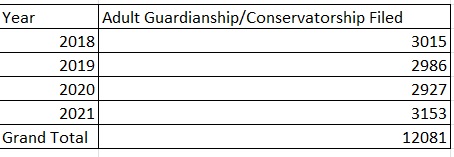
Update: Some 2,991 new cases were filed in 2022.
At the end of 2021, there were 30,537 active guardianship cases in the state, reflecting an increase of 2,121 active cases since 2018.
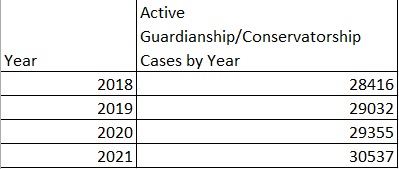
Update: There were 32,694 open cases at the end of 2022.
Update: (10-19-22) A new records request was submitted to the Office of State Courts Administrator asking for materials regarding the education and training of judges, court appointed attorneys, and guardians regarding their role in adult guardianship proceedings and their duties under the Americans with Disabilities Act. To read the request, click here.
October 14, 2022
Supreme Court Responds to ADA Records Request

Spectrum Institute sent an administrative records request to the Missouri Supreme Court on September 26, 2022. The request sought records on: (1) the Court's ADA policies; (2) any self-evaluation done by the Court on its ADA policies and practices; and (3) its grievance procedure to process complaints that its policies or practices do not comply with the requirements of federal law. Obtaining these records is a prerequisite to a proper evaluation of whether the courts in Missouri are meeting their obligations to ensure that litigants with mental or developmental disabilities are receiving access to justice in guardianship proceedings and meaningful participation in these liberty-encroaching cases. For a copy of the request, click here.
Update (10-14-22) The Clerk of the Supreme Court responded to our request for ADA-related records through a letter that attached two documents: (1) policy on access to courts; and (2) Supreme Court's ADA grievance procedure. The letter also directed our attention to a webage addressing "disabled access" to court buildings. The letter concluded by stating that "this Court does not have any records pertaining to self-evaluations performed pursuant to 28 C.F.R. § 35.105 regarding adult guardianship proceedings or any other judicial proceedings." We independently found a webpage on the judicial branch website pertaining to general policies of the Missouri Courts regarding the ADA and disability nondiscrimination. That webpage states: "In accordance with the ADA, the Missouri judiciary will not discriminate against qualified individuals with disabilities in its services, programs or activities." It also provides a list of ADA coordinators for each court in the state to which individuals may direct requests for accommodations. We were unable to find anything on the judicial branch website regarding the obligations of courts, even without a request, to provide accommodations to litigants with known or obvious disabilities. The policies and practices of the judicial branch appear to be premised on the need for a request despite the fact that federal law states otherwise.
October 5, 2022
Interview with Probate PJ in Jackson County
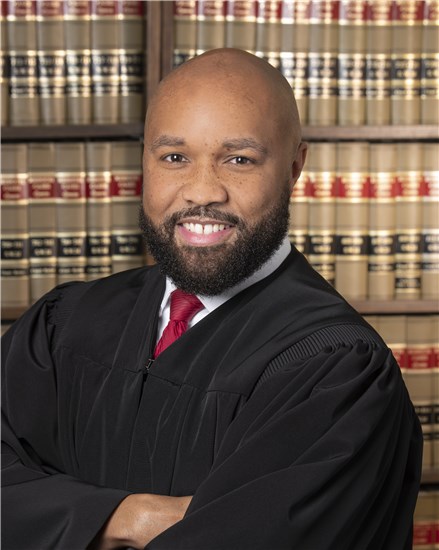 Thomas
F. Coleman, consultant to the Alternatives to Guardianship Project,
interviewed the Honorable Mark A, Styles, Presiding Judge of the Probate
Division of the Jackson County Circuit Court. Judge Styles was
very cooperative and provided information that is helpful to
understanding the current policies and practices of that court related
to adult guardianship proceedings. According to Styles, his court
has the third largest caseload of adult guardianship cases in the state,
with St. Louis County having the highest caseload and St. Louis City the
second. He estimates that about 400 new petitions are filed in his
court annually and that the court is protecting about 5,000 adults who
are currently living under an order of guardianship. There is one
attorney who is appointed by the court to represent respondents. Three
bench officers, Styles and two commissioners, process new and active
cases. In addition to adjudicating the merits of the 400 new petitions,
they must review and approve 5,000 annual reports filed by guardians.
Information obtained during this interview will be included in a report
on judicial proceedings that will be issued in the future by the
project.
Thomas
F. Coleman, consultant to the Alternatives to Guardianship Project,
interviewed the Honorable Mark A, Styles, Presiding Judge of the Probate
Division of the Jackson County Circuit Court. Judge Styles was
very cooperative and provided information that is helpful to
understanding the current policies and practices of that court related
to adult guardianship proceedings. According to Styles, his court
has the third largest caseload of adult guardianship cases in the state,
with St. Louis County having the highest caseload and St. Louis City the
second. He estimates that about 400 new petitions are filed in his
court annually and that the court is protecting about 5,000 adults who
are currently living under an order of guardianship. There is one
attorney who is appointed by the court to represent respondents. Three
bench officers, Styles and two commissioners, process new and active
cases. In addition to adjudicating the merits of the 400 new petitions,
they must review and approve 5,000 annual reports filed by guardians.
Information obtained during this interview will be included in a report
on judicial proceedings that will be issued in the future by the
project. September 8, 2022
Duties of Appointed Counsel: Policy vs. Practice
 The
sentence in the box to the left is taken from an excellent article
published this year in the St. Louis Bar Journal. Titled "Due
Process and Best Interests: The Challenges of Guardianship Cases," the
article is written by Heather Hall and Josh Rose. Both are
attorneys whose practice includes cases in which they are appointed by
the court to represent adults living under an order of guardianship or
who are targeted by a guardianship petition.
The
sentence in the box to the left is taken from an excellent article
published this year in the St. Louis Bar Journal. Titled "Due
Process and Best Interests: The Challenges of Guardianship Cases," the
article is written by Heather Hall and Josh Rose. Both are
attorneys whose practice includes cases in which they are appointed by
the court to represent adults living under an order of guardianship or
who are targeted by a guardianship petition.
The article spells out in considerable detail the rights of such adults in guardianship proceedings. One of them is the right to have counsel who advocates for their wishes and protects their rights. One such right is to have appointed counsel seriously explore less restrictive alternatives and to argue for such, including demanding an evidentiary hearing or jury trial on the matter if necessary. What the article does not address, however, is the extent to which such attorneys are doing this in actual practice. Nor does it address how attorneys are impeded in providing such advocacy because they are often paid a flat fee of a few hundred dollars which, in effect, puts them in a bind and creates an actual or apparent conflict of interest. Put in three hours and earn about $150 per hour or put in more hours and perform the extra work for free.
The Alternatives to Guardianship Project will be investigating how many lawyers serve as appointed counsel in Missouri, how they are trained, if they have performance standards to meet, how much they are paid, and what system of monitoring exists to ensure that clients who generally cannot identify deficient performance (ad therefore cannot complaint about malpractice) receive the quality of representation that due process and the Americans with Disabilities Act would require. It will also examine the duties of the state and of counties to allocate sufficient funds to enable attorneys to provide effective assistance to indigent clients and steps that public entities can take to increase the level funding for guardianship legal defense and advocacy services.
September 7, 2022
Supreme Court Asked about Status of ADA Complaint
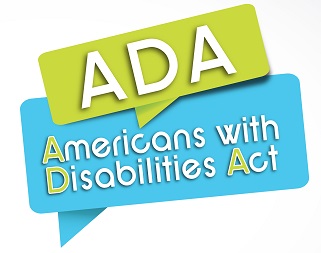 The
Alternatives to Guardianship Project has sent a letter to the Missouri
Supreme Court inquiring into what actions, if any, it took in response
to an ADA complaint filed by Spectrum Institute with the Court in 2017.
The complaint alleged that the state's adult guardianship system was out
of compliance with requirements of Title II of the federal Americans
with Disabilities Act. The court clerk acknowledged receipt of the
complaint in 2018, indicating that it was "under review" by the Court.
Despite a follow-up inquiry by Spectrum Institute in 2019, the
organization never heard from the Court on the matter again. This
outreach to the Court by the Project is part of its due diligence to
determine what actions have been taken by any officials or public
entities to improve the administration of justice in guardianship
proceedings. To read the letter from the Project to the Court,
click here. To read the
ADA complaint and related materials,
click here.
The
Alternatives to Guardianship Project has sent a letter to the Missouri
Supreme Court inquiring into what actions, if any, it took in response
to an ADA complaint filed by Spectrum Institute with the Court in 2017.
The complaint alleged that the state's adult guardianship system was out
of compliance with requirements of Title II of the federal Americans
with Disabilities Act. The court clerk acknowledged receipt of the
complaint in 2018, indicating that it was "under review" by the Court.
Despite a follow-up inquiry by Spectrum Institute in 2019, the
organization never heard from the Court on the matter again. This
outreach to the Court by the Project is part of its due diligence to
determine what actions have been taken by any officials or public
entities to improve the administration of justice in guardianship
proceedings. To read the letter from the Project to the Court,
click here. To read the
ADA complaint and related materials,
click here.
Update: (9-24-22) We received a reply from the general counsel to the Supreme Court indicating that the Court did not take any action in response to the ADA complaint from Spectrum Institute, explaining that it wanted to see how a new law would be implemented. However, the letter indicates that the Court is open to receiving additional materials for consideration on the subject. We passed this information on to Spectrum Institute and have been informed that it will be providing the Court with additional materials on the application of the ADA to adults guardianship proceedings.
September 6, 2022
Analysis of Missouri's Policies and Practices is Underway
 The
Alternatives to Guardianship Project has initiated an analysis of the
policies governing Missouri's adult guardianship proceedings as well as
the practices of judges, attorneys, and a variety of professionals who
are involved in these cases. Policies include statutes, court
rules, appellate rulings, and training programs for judges and
attorneys. Practices pertain to how the system operates in real
life. This research is foundational to the mission of the project.
We will identify areas where policy is good or deficient. We will
compare Missouri's policies on guardianship and alternatives with those
in other states, especially in places where reforms have occurred.
We will also identify areas where actual practices do not conform to
existing policies. In addition, we will endeavor to obtain a
census of adults under guardianship and demographics showing who they
are. All of this will eventfully be included in an action report
which will contain our findings and recommendations.
The
Alternatives to Guardianship Project has initiated an analysis of the
policies governing Missouri's adult guardianship proceedings as well as
the practices of judges, attorneys, and a variety of professionals who
are involved in these cases. Policies include statutes, court
rules, appellate rulings, and training programs for judges and
attorneys. Practices pertain to how the system operates in real
life. This research is foundational to the mission of the project.
We will identify areas where policy is good or deficient. We will
compare Missouri's policies on guardianship and alternatives with those
in other states, especially in places where reforms have occurred.
We will also identify areas where actual practices do not conform to
existing policies. In addition, we will endeavor to obtain a
census of adults under guardianship and demographics showing who they
are. All of this will eventfully be included in an action report
which will contain our findings and recommendations.
August 31, 2022
Project to Review SDM Laws in California and Elsewhere
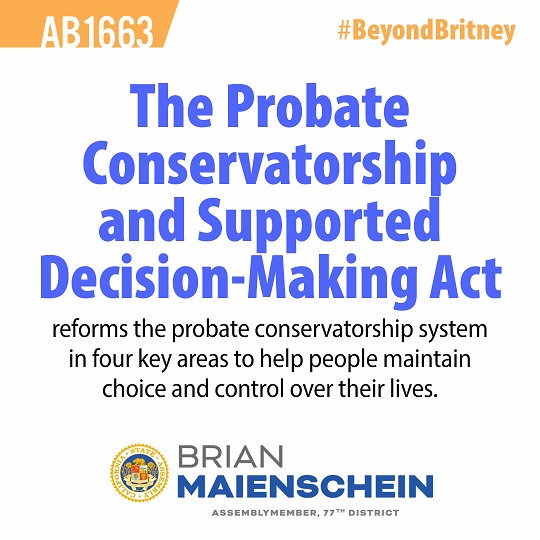 The
California Legislature gave final approval in August 30 to a bill that
will: (1) require alternatives to conservatorship to be seriously
considered by petitioners and ruled out as unfeasible by the court; (2)
strengthen the rights of adults living under an order of
conservatorship; (3) give conservatees the right to petition for
termination once a year and to have an attorney appointed to assist them
if they inform the court of the desire to terminate. After an
appropriation of funds by the legislature, courts will be required to
operate self-help centers to explain and help petitioners explore less
restrictive alternatives such as supported decision-making and powers of
attorney. There were no dissenting votes in either the Senate or
Assembly. The bill is expected to be signed into law by the
governor in September and will take effect on January 1, 2023. To
read the Assembly Floor Analysis of the bill,
click here. The Alternatives to Guardianship Project will be
analyzing how provisions of AB 1663 can be adapted for use in Missouri.
The project will also analyze and compare SDM laws in New York (see
below) and those in
Texas (2015),
Delaware (2015),
Wisconsin (2018),
North Dakota (2019),
Rhode Island (2019),
Indiana (2019),
Nevada (2019),
Washington (2020),
Louisiana (2020) and
Colorado (2021).
The
California Legislature gave final approval in August 30 to a bill that
will: (1) require alternatives to conservatorship to be seriously
considered by petitioners and ruled out as unfeasible by the court; (2)
strengthen the rights of adults living under an order of
conservatorship; (3) give conservatees the right to petition for
termination once a year and to have an attorney appointed to assist them
if they inform the court of the desire to terminate. After an
appropriation of funds by the legislature, courts will be required to
operate self-help centers to explain and help petitioners explore less
restrictive alternatives such as supported decision-making and powers of
attorney. There were no dissenting votes in either the Senate or
Assembly. The bill is expected to be signed into law by the
governor in September and will take effect on January 1, 2023. To
read the Assembly Floor Analysis of the bill,
click here. The Alternatives to Guardianship Project will be
analyzing how provisions of AB 1663 can be adapted for use in Missouri.
The project will also analyze and compare SDM laws in New York (see
below) and those in
Texas (2015),
Delaware (2015),
Wisconsin (2018),
North Dakota (2019),
Rhode Island (2019),
Indiana (2019),
Nevada (2019),
Washington (2020),
Louisiana (2020) and
Colorado (2021).
August 30, 2022
New York SDM Law to be Analyzed
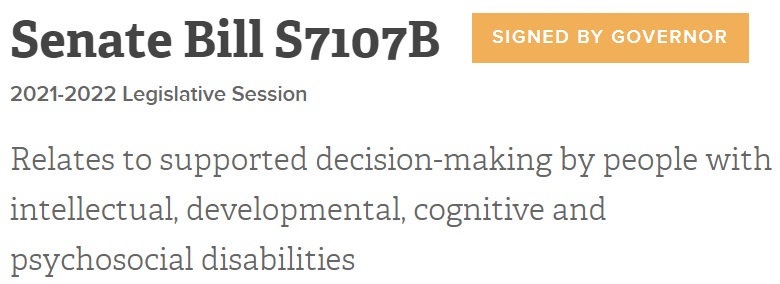
The Governor of New York signed into law a supported decision-making statute on statute on July 26, 2022. The law finds that adults with mental and developmental disabilities are often denied the right to make decisions based on stigmas and outdated beliefs about their capabilities. It recognizes that supported decision-making can be a less restrictive alternative to guardianship. It expresses a public policy to encourage the use of supported decision-making arrangements when they are feasible. An analysis of capacity shall take into account capacity with decision-making support or accommodations. The statute also defines supported decision-making, the role and duties of a support person, and the requirements for creating such an agreement. To read the new law, click here. The project will be analyzing the bill to determine if elements of it may be adapted for use in Missouri.
August 25, 2022
Project to Include a Mental Health Component
 Many
adults with developmental disabilities have concurrent mental health
challenges and illnesses. Failure to address and treat these
conditions may impair the feasibility of implementing alternatives to
guardianship such as supported decision-making. The same is true
for adults with developmental disabilities who are living under an order
of guardianship. Treatment of adverse mental health conditions may
be a necessary prerequisite to terminating a guardianship in favor of a
less restrictive alternative.
Many
adults with developmental disabilities have concurrent mental health
challenges and illnesses. Failure to address and treat these
conditions may impair the feasibility of implementing alternatives to
guardianship such as supported decision-making. The same is true
for adults with developmental disabilities who are living under an order
of guardianship. Treatment of adverse mental health conditions may
be a necessary prerequisite to terminating a guardianship in favor of a
less restrictive alternative.
It is therefore important to educate adults with developmental
disabilities, their families, medical and mental health professionals,
service providers, attorneys, and judges about the adverse consequences
of failing to provide prompt and appropriate mental health services to
such adults as an essential component of enabling them to exercise their
right to self determination and to avoid or terminate otherwise
unnecessary guardianships.
Tina Baldwin is the director of the Mental Health Project of Spectrum
Institute. She oversaw the development of a
recent report on the consequences to adults with developmental
disabilities when necessary mental health services and therapy are
delayed or denied. Tina will serve as a consultant to the
Alternatives to Guardianship Project and Hulme Resources to educate
stakeholders in the guardianship system in Missouri about these
consequences and how to enhance mental health services for this
population in order to avoid them. The first steps will include an
assessment of the availability of mental health services for adults with
developmental disabilities in the state, whether they are in a
guardianship or not, and to solicit suggestions from stakeholders on how
to make such services more accessible and more responsive to the needs
of this population.
August 11, 2022
Outreach to Department of Mental Health
 A
letter was sent to Valerie Huhn, Director of the Missouri Department of
Mental Health. The letter inquires whether the Department would
consider convening a workgroup to review the application of the ADA
Olmstead principles to adults guardianship proceedings. It calls
attention to the following statement on the Department's website:
“Title II of the ADA requires that any entity administering public funds
must ensure
services, programs, and activities are provided in the most integrated
setting
appropriate to the needs of qualified individuals with disabilities.
Persons served
must be informed that they have the right to receive services in the
most integrated
setting appropriate to their needs.” For a copy of the letter,
click here.
A
letter was sent to Valerie Huhn, Director of the Missouri Department of
Mental Health. The letter inquires whether the Department would
consider convening a workgroup to review the application of the ADA
Olmstead principles to adults guardianship proceedings. It calls
attention to the following statement on the Department's website:
“Title II of the ADA requires that any entity administering public funds
must ensure
services, programs, and activities are provided in the most integrated
setting
appropriate to the needs of qualified individuals with disabilities.
Persons served
must be informed that they have the right to receive services in the
most integrated
setting appropriate to their needs.” For a copy of the letter,
click here.August 10, 2022
Spanish Language SDM Presentation
The following flyer was sent to Spanish speaking families of adults with developmental disabilities.
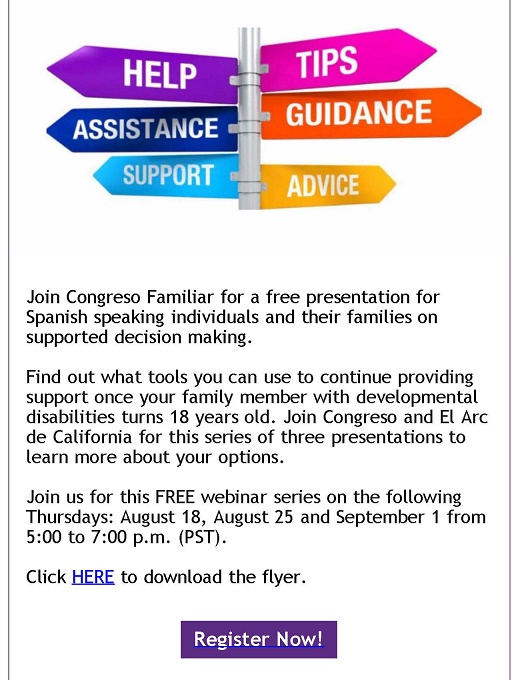
August 9, 2022
Survey Being Distributed to Stakeholders
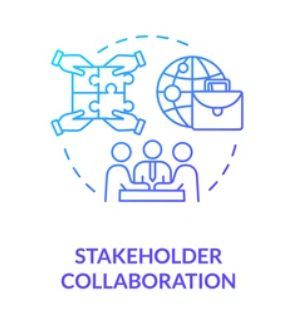 The
project is conducting a survey of agencies and organizations with an
interest in promoting alternatives to guardianship and improving the
administration of justice in guardianship proceedings. We want to
build upon the work that has already been done on these issues in the
recent past in Missouri. The first three letters have been sent
to: Missouri Protection and Advocacy;
Institute on Human Development at the
University of Missouri at Kansas City; and
Mo-WINGS (Missouri Working Interdisciplinary Network of Guardianship
Stakeholders). Other letters will be sent out soon.
The
project is conducting a survey of agencies and organizations with an
interest in promoting alternatives to guardianship and improving the
administration of justice in guardianship proceedings. We want to
build upon the work that has already been done on these issues in the
recent past in Missouri. The first three letters have been sent
to: Missouri Protection and Advocacy;
Institute on Human Development at the
University of Missouri at Kansas City; and
Mo-WINGS (Missouri Working Interdisciplinary Network of Guardianship
Stakeholders). Other letters will be sent out soon.Update: (12-9-22) Missouri P&A responded to our inquiry with a letter explaining its activities promoting alternatives to guardianship as a matter of policy, producing educational materials and forums, counseling clients, drafting supported decision-making agreements, and representing clients in guardianship proceedings.
August 9, 2022
Records Request Sent to Supreme Court
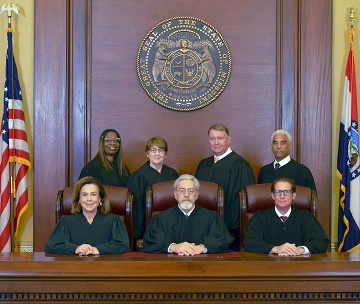 The
project sent a request today to the Missouri State Courts Administrator
asking for records pertaining to administrative actions that have been
taken by the Supreme Court over the past several years to promote
alternatives to guardianship or improve the administration of justice in
adult guardianship proceedings. The Supreme Court is responsible
or administrative oversight of state courts and the state bar.
Meaningful guardianship reform will not occur in Missouri without the
leadership or cooperation of the Missouri Supreme Court. For a
copy of the records request,
click here.
The
project sent a request today to the Missouri State Courts Administrator
asking for records pertaining to administrative actions that have been
taken by the Supreme Court over the past several years to promote
alternatives to guardianship or improve the administration of justice in
adult guardianship proceedings. The Supreme Court is responsible
or administrative oversight of state courts and the state bar.
Meaningful guardianship reform will not occur in Missouri without the
leadership or cooperation of the Missouri Supreme Court. For a
copy of the records request,
click here.The website of the Supreme Court explains: "In addition to making legal decisions, the Supreme Court supervises all the lower state courts with the assistance of its state courts administrator's office, which oversees court programs, provides technical assistance, manages the Judiciary's budget, and conducts educational programs for judicial personnel. The Supreme Court also makes detailed practice and procedure rules that ensure uniform handling of Missouri court cases, including times for filing motions and admitting evidence. In addition, the Supreme Court licenses all attorneys practicing in Missouri, maintains the official roll of attorneys, and disciplines lawyers and judges for violating ethical rules of conduct."
Update (8-19-22): The State Courts Administrator replied to our records request, stating that she is not the custodian of administrative records of the Supreme Court. We therefore sent an identical records request to the Supreme Court Clerk today. Update (9-1-22): The Clerk of the Supreme Court sent a letter stating that the Court was not in possession of or the custodian of any of the requested records. This implies that the Court has taken none of the actions mentioned in the records request.
August 7, 2022
Review of SDM Progress in Texas
 Jennifer
Hulme and Thomas Coleman interviewed Richard Lavallo, Legal Director of
Disability Rights Texas (DRT), about progress that has been made in that
state in recent years to promote alternatives to guardianship such as
supported decision-making (SDM). We were impressed by the depth
and scope of supported decision-making legislation enacted in 2015 and
by what DRT and others have done to implement these measures in the
educational system and in judicial proceedings. We will be
studying the progress that has been made in Texas and will issue a
future report on how aspects of the Texas model could be considered in
Missouri. To access the references and resources on the DRT
website,
click here.
Jennifer
Hulme and Thomas Coleman interviewed Richard Lavallo, Legal Director of
Disability Rights Texas (DRT), about progress that has been made in that
state in recent years to promote alternatives to guardianship such as
supported decision-making (SDM). We were impressed by the depth
and scope of supported decision-making legislation enacted in 2015 and
by what DRT and others have done to implement these measures in the
educational system and in judicial proceedings. We will be
studying the progress that has been made in Texas and will issue a
future report on how aspects of the Texas model could be considered in
Missouri. To access the references and resources on the DRT
website,
click here. Update: 9-15-22: A new report from Disability Rights Texas (DRTx), Overcoming Civil Death, exposes the broken system that imprisons many Texans with disabilities in unnecessary guardianships that limit their freedom and independence. Many people with disabilities have the capacity to have their rights restored, make their own decisions, and be a part of their community. And in many cases, the law is already in place to allow this to happen. But due to various obstacles, many people with disabilities remain in unnecessary guardianships and experience what is known as civil death. For a press release about the new report, click here.